Related Research Articles
The Technical University of Denmark, often simply referred to as DTU, is a polytechnic university and school of engineering. It was founded in 1829 at the initiative of Hans Christian Ørsted as Denmark's first polytechnic, and it is today ranked among Europe's leading engineering institutions. It is located in the town Kongens Lyngby, 12 kilometres (7.5 mi) north of central Copenhagen, Denmark.

The Ludwig Maximilian University of Munich is a public research university in Munich, Bavaria, Germany. Originally established as the University of Ingolstadt in 1472 by Duke Ludwig IX of Bavaria-Landshut, it is Germany's sixth-oldest university in continuous operation.
The German Research Foundation is a German research funding organization, which functions as a self-governing institution for the promotion of science and research in the Federal Republic of Germany. In 2019, the DFG had a funding budget of €3.3 billion.
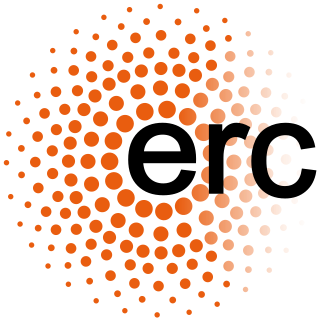
The European Research Council (ERC) is a public body for funding of scientific and technological research conducted within the European Union (EU). Established by the European Commission in 2007, the ERC is composed of an independent Scientific Council, its governing body consisting of distinguished researchers, and an Executive Agency, in charge of the implementation. It forms part of the framework programme of the union dedicated to research and innovation, Horizon 2020, preceded by the Seventh Research Framework Programme (FP7). The ERC budget is over €13 billion from 2014 – 2020 and comes from the Horizon 2020 programme, a part of the European Union's budget. Under Horizon 2020 it is estimated that around 7,000 ERC grantees will be funded and 42,000 team members supported, including 11,000 doctoral students and almost 16,000 post-doctoral researchers.

Marc, Baron Henneaux is a Belgian theoretical physicist and professor at the Université Libre de Bruxelles (ULB) who was born in Brussels on 5 March 1955.

Günter Matthias Ziegler is a German mathematician who has been serving as president of the Free University of Berlin since 2018. Ziegler is known for his research in discrete mathematics and geometry, and particularly on the combinatorics of polytopes.
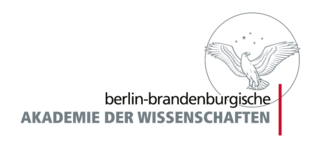
The Berlin-Brandenburg Academy of Sciences and Humanities, abbreviated BBAW, is the official academic society for the natural sciences and humanities for the German states of Berlin and Brandenburg. Housed in three locations in and around Berlin, Germany, the BBAW is the largest non-university humanities research institute in the region.

The Lindau Nobel Laureate Meetings are annual scientific conferences held in Lindau, Bavaria, Germany, since 1951. Their aim is to bring together Nobel laureates and young scientists to foster scientific exchange between different generations, cultures and disciplines. The meetings assume a unique position amongst international scientific conferences, as from 30 to 65 Nobel laureates attending each edition they are the largest regular congregation of Nobel laureates in the world, apart from the Nobel Prize award ceremony in Stockholm.
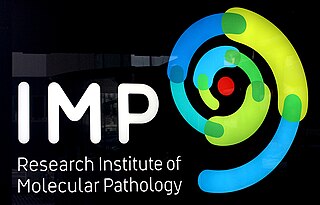
The Research Institute of Molecular Pathology (IMP) is a biomedical research center, which conducts curiosity-driven basic research in the molecular life sciences.

Ernst-Ludwig Winnacker is a German geneticist, biochemist and research manager. His main fields of research are virus/cell interaction, the mechanisms of gene expression in higher cells and prion diseases. He was President of the German Research Foundation and Secretary General of the European Research Council and is Secretary General of the Human Frontier Science Program Organization.
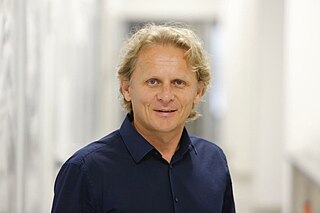
Ivan Đikić is a Croatian-German molecular biologist who is the Director of the Institute of Biochemistry II at Goethe University Frankfurt.
Ryszard Horodecki is a Polish physicist and a professor of University of Gdańsk. He contributed largely to the field of quantum informatics. In his most widely cited paper, 'Separability of Mixed States: Necessary and Sufficient Conditions' written together with his sons, Michał and Paweł, he proposed the idea currently known as the Peres-Horodecki criterion. With over 12,000 citations, he is considered to be one of the leading Polish physicists.
Frank Klaus Glorius is a German chemist and W3-Professor of organic chemistry in the Department of Chemistry and Pharmacy at the University of Münster.
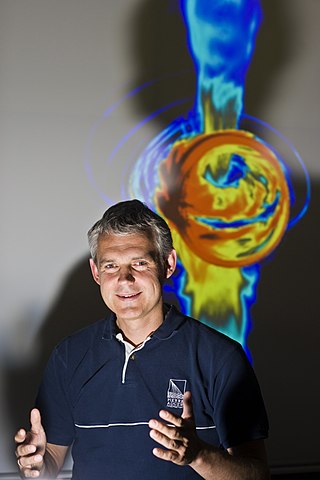
Heino Falcke is a German professor of radio astronomy and astroparticle physics at the Radboud University Nijmegen (Netherlands). His main field of study is black holes, and he is the originator of the concept of the 'black hole shadow'. In 2019, Falcke announced the first Event Horizon Telescope results at the EHT Press Conference in Brussels.

Andrea Ablasser is a German immunologist, who works as a full professor of Life Sciences at the École Polytechnique Fédérale de Lausanne. Her research has focused on how the innate immune system is able to recognise virus-infected cells and pathogens.
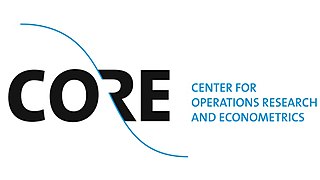
The Center for Operations Research and Econometrics (CORE) is an interdisciplinary research institute of the University of Louvain (UCLouvain) located in Louvain-la-Neuve, Belgium. Since 2010, it is part of the Louvain Institute of Data Analysis and Modeling in economics and statistics (LIDAM), along with the Institute for Economic and Social Research (IRES), Louvain Finance (LFIN) and the Institute of Statistics, Biostatistics and Actuarial Sciences (ISBA).
Daniel Wolfram Gerlich is a German cell biologist. Since 2012 he has been a Senior Group Leader at the Institute of Molecular Biotechnology (IMBA) of the Austrian Academy of Sciences in Vienna.
Stefan Roth is a German computer scientist, professor of computer science and dean of the department of computer science of the Technische Universität Darmstadt. He heads the Visual Inference Lab.
Nynke Hester Dekker is a Dutch biophysicist who since 2024 has been Professor of Biophysics at the Department of Physics, University of Oxford. Before this she was Professor of Molecular Biophysics at the Kavli Institute of Nanoscience at Delft University of Technology. Dekker studies individual DNA and RNA molecules and how they interact with proteins in bacteria, viruses and eukaryotes. She described how virus proteins build errors into the virus RNA of viruses. In 2020, she was awarded the Spinoza Prize.
The Einstein Foundation Berlin is a foundation based in Berlin, Germany "that aims to promote science and research of top international caliber in Berlin and to establish the city as a centre of scientific excellence." It does this through various objectives, including the cross-institutional promotion of Berlin research projects, the appointment of outstanding scientists to Berlin, targeted support for young researchers, and better cooperation between university, non-university, and private sector institutions.
References
- ↑ "European Science Foundation: What is EURYI?".
- ↑ "European Commission: Nobel Prize-sized EURYI awards go to 20 young researchers".
- ↑ N. Williams (2005). "EURYI scheme aims to stop women disappearing". Nature. 437 (7056): 192. doi: 10.1038/437192c . PMID 16148910. S2CID 4427705.
- ↑ "Creating the era "bottom up": Cross-border research cooperation in Europe" (PDF).
- ↑ "European Commission: ERC: An idea whose time has come".